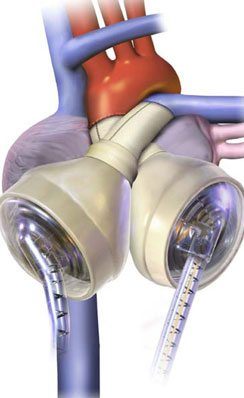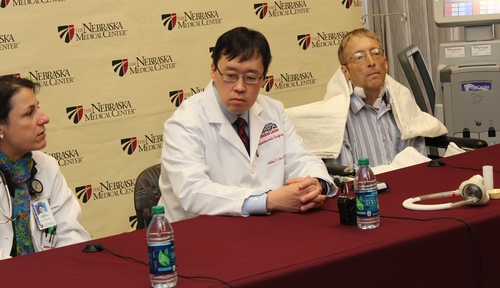Greg Rathe’s first heart transplant, in 1996, followed a sudden onset of cardiomyopathy, the weakening of the heart muscles. Early this year, his symptoms returned.
“I felt weak and couldn’t breathe,” Rathe says. “When I got here to the med center, they said I’d need a new heart.”
“His condition deteriorated very quickly,” recalls Mike Moulton, M.D., chief of cardiothoracic surgery and heart transplant surgeon.
Rathe lost consciousness the second week in March. His donated heart was failing. “We knew if we didn’t move forward with the Total Artificial Heart, Greg would not survive,” said John Um, M.D., surgical director of cardiac transplantation and mechanical circulatory support.
 |
The Total Artificial Heart |
Drs. Moulton and Um implanted the Total Artificial Heart on March 14, the first time this procedure had been performed in Nebraska.
During heart failure, the heart cannot pump enough blood to supply vital organs with oxygen and nutrients. When one side of the heart is failing, a patient can be put on a left- or right-ventricular assist device. Rathe’s heart needed help on both sides.
“Greg had chronic rejection of his donated heart,” Dr. Moulton said. “Because his heart had deteriorated to such a degree, a Total Artificial Heart was the only option.”
Though not a permanent solution, the Total Artificial Heart is a “bridge to transplant,” meaning it can allow a patient to regain their strength until a suitable donor heart is found. It provides high volume blood flow of up to 9.5 liters per minute through each ventricle, which helps speed the recovery of the patient’s organs, making them a better candidate for heart transplant. According to SynCardia, makers of the device, patients have survived nearly four years before receiving a successful transplant. Doctors expect Rathe to have his artificial heart for one to six months.
“The Total Artificial Heart is the most advanced support available,” said Ioana Dumitru, M.D., medical director of Heart Failure and Cardiac Transplantation. “It can now be used to treat patients from our region who would have a very difficult time traveling long distances to receive this therapy.”
The Nebraska Medical Center is the only hospital in Nebraska with this treatment option.
“Bringing the Total Artificial Heart technology to the region continues to demonstrate The Nebraska Medical Center’s leadership and commitment in the treatment of cardiovascular disease,” said Jorge Parodi, executive director of Cardiovascular and Pulmonary Services.

Amazing, NMC!!!!!! Our prayers are with you and your family, Mr. Rathe!